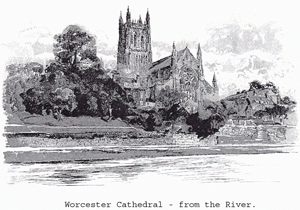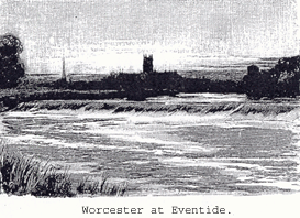To those interested in the topography and the local or social history of Worcestershire and how incidents in her life were transformed in her fiction, what follows is a summary of some of the events Charles Wood describes in his now scarce book on his mother.
Ellen Price was born on 17th January 1814, the eldest of two daughters of Thomas and Elizabeth Price. Thomas Price had inherited the family business of a large glove manufactory in Worcester. Wood memorialised her father at least twice in her fiction. He appears in her portrayal of the kindly 'Helstonleigh' glove manufacturer, Thomas Ashley, in Mrs. Halliburton's Troubles. (Helstonleigh was Wood's alias for Worcester, which she adopted in several of her novels). Dr. Rolf Burgauer suggests that William Arkell in Mildred Arkell was another character in Wood's work that was based on her father. Wood utilized her first-hand knowledge of the flood of cheap foreign imports in her father's business, to depict the ensuing depression amongst the workers' families in both of these books, and also in A Life's Secret.
Dr. Burgauer was unable to detect Elizabeth Price as a character in any of her daughter's novels. However, he quite rightly suggests that Wood's mother provided the ultimate inspiration behind Wood's writing career. Elizabeth Price had a very fertile imagination, but she also often had strange, prophetic dreams which came true, and she believed she often saw supernatural spirits and phenomena - all elements which appear in Wood's novels and stories. (I am indebted to Jocelyn Bailey who has translated the relevant section from Burgauer's book, which discusses the importance of Wood's mother).
For some reason, never explained by Charles Wood, his mother was raised by her paternal grandparents, until the death of her grandfather when she was seven. [In Charles Wood's two memoirs he says that his mother was reared in the house of her Price grandparents. Therefore, all later commentators who state she was reared by her maternal grandparents must be incorrect]. Charles Wood does not attempt to elaborate on his mother's feelings on being parcelled off to her grandparents. However, this upbringing might account for the high incidence of lost and stolen children that propel the narratives of some of her short stories. Charles Wood also informs us that the young Ellen was only permitted to be with her grandmother at "stated times". For the remainder of her day the young girl was often placed in the company of the housekeeper, a Mrs. Tipton.
A couple of elements in Ellen Wood's early childhood in her grandmother's household stand out as having significance to her later fiction. For instance, we discover that Wood's intimate knowledge of the Worcestershire countryside, relevant to so many of her later tales was gleaned on long afternoon carriage drives with her grandmother and Mrs. Tipton. Wood had a remarkable memory, and just as she could recite Gray's Elegy and Goldsmith's Deserted Village by heart at the age of seven, her son suggests that these childhood excursions provided the necessary intimate knowledge for the countryside settings she was to depict in her Johnny Ludlow tales and some of her novels.
"S.M.C.", the anonymous Victorian author suggests that villages which appear in the Johnny Ludlow tales are based on Ombersly, Hagley and Clent. However, other Worcestershire locations are not so heavily disguised. Worcester appears as 'Helstonleigh' in The Channings, Mrs. Halliburton's Troubles and Roland Yorke, but under its real name in several other novels and in many Johnny Ludlow stories. For instance in the latter series, Worcester race course provides the backdrop to at least two tales: 'The Other Earring' (1874) and 'Ketira the Gypsy' (1876). The Johnny Ludlow stories often feature interesting glimpses of what are now obsolete social customs. In 'Going to the Mop' (1871) Mrs. Todhetley visits the annual St. John's Michaelmas Mop in Worcester, otherwise known as the Statute Fair, in order to try and hire a new dairymaid. In addition to Worcester itself the Johnny Ludlow tales also provide insights into Droitwich, Evesham and Malvern as they appeared over a century ago.
Another advantage to Wood's fiction of staying in her grandmother's house was the close proximity of Worcester cathedral. This provided Wood with the opportunity of observing the young college boys at close quarters. Ellen's own brothers were pupils at the cathedral school. The choristers of Worcester cathedral and the antics of young boys were ingredients which were to resurface in much of Wood's best work, including the Johnny Ludlow tales and The Channings. The boys in Wood's narratives were portrayed with incredible fidelity for their period, and were much commented on by contemporary critics. Each boy has his own individuality and character, and very few are too good to be believable. Adeline Sergeant, a fellow-author, considered Wood's schoolboys were "particularly well drawn."

Interior View of King's School Room before restoration.
A more serious moment from this period is related by Charles Wood, almost in the form of a miniature short story. One day Mrs. Tipton was walking with her young charge across a field when they were charged by a bull. Mrs. Tipton scooped up the child and ran for safety, reaching the hedge but not the nearby stile. Charles Wood dramatically informs us "scarcely knowing what she did, wild with terror, she threw the child over the hedge into the adjoining field." Ellen seemed unscathed after her ordeal, but her son suggests that this moment may have been the source of his mother's later curvature of the spine. Even this terrifying childhood incident was utilized and transformed by Wood in one of her novels. In Trevlyn Hold, Mr. Ryle is actually gored by a bull, and his children left fatherless.
Wood did not always have a conventional attitude to the Worcestershire countryside. Charles Wood informs us that some family summer holidays were spent in the country. However, the young girl found herself strangely affected by the contrasting quiet of the countryside after the bustle of life in town. In Charles Wood's words:

